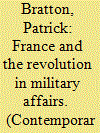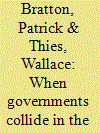| Srl | Item |
| 1 |
ID:
112192


|
|
|
|
|
| Publication |
2012.
|
| Summary/Abstract |
India took an unprecedented step 10 years ago by setting up a joint theatre operational command for the Andaman and Nicobar Islands (ANC). This article seeks to examine the following questions: why did India decide to establish its first joint operational command? Why has the creation of this and other unified commands been so incremental in the Indian context? What are the arguments for and against jointness, integration and joint operational commands in the Indian context? The article will firstly discuss the concept of joint operational commands and then theories of organisational military change. Secondly, it will look at the debate in India about jointness and these commands, and how this led to the creation of the ANC. Lastly, it will conclude with observations about the ANC and the future of similar commands in the Indian context. Unless disaster or political events incentivise Indian politicians to force change on the defence establishment, it is unlikely that there will be any further joint operational theatre commands (like the ANC) in the future, but joint operational functional commands (like the strategic forces command, SFC) are more likely.
|
|
|
|
|
|
|
|
|
|
|
|
|
|
|
|
| 2 |
ID:
022357


|
|
|
|
|
| Publication |
Aug 2002.
|
| Description |
87-112
|
|
|
|
|
|
|
|
|
|
|
|
|
|
|
|
| 3 |
ID:
097318


|
|
|
|
|
| Publication |
2010.
|
| Summary/Abstract |
How effective was the Indian government in sending clear, coercive signals and orchestrating them into coherent messages during 'Operation Parakram' in 2001-02? This study finds that compellence was hampered by three factors: (1) the government kept changing its demands; (2) the lack of adequate civil-military coordination; and (3) the government engaged in a dual-track policy of direct coercion of Pakistan, while simultaneously engaging the United States to put pressure on Pakistan. Ultimately, these two policy strands worked at cross-purposes to each other.
|
|
|
|
|
|
|
|
|
|
|
|
|
|
|
|
| 4 |
ID:
103919


|
|
|
|
|
| Publication |
2011.
|
| Summary/Abstract |
How effective are parliamentary democracies at sending coercive signals and orchestrating them into coherent messages? Are parliamentary democracies any better at doing this than presidential democracies? In order to answer these questions, the research project uses an in-depth analysis of the 1982 Falklands/Malvinas War as a case study. This article seeks to determine how effective the United Kingdom was at sending coercive signals and orchestrating them into coherent messages. In general we observe that the United Kingdom suffered from many of the same problems in executing a coercive strategy as presidential governments do.
|
|
|
|
|
|
|
|
|
|
|
|
|
|
|
|